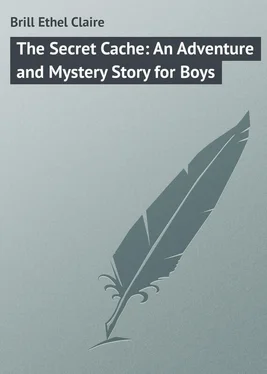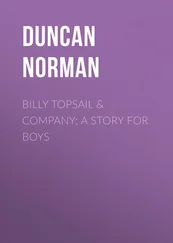Ethel Brill - The Secret Cache - An Adventure and Mystery Story for Boys
Здесь есть возможность читать онлайн «Ethel Brill - The Secret Cache - An Adventure and Mystery Story for Boys» — ознакомительный отрывок электронной книги совершенно бесплатно, а после прочтения отрывка купить полную версию. В некоторых случаях можно слушать аудио, скачать через торрент в формате fb2 и присутствует краткое содержание. ISBN: , Жанр: Прочие приключения, foreign_prose, на английском языке. Описание произведения, (предисловие) а так же отзывы посетителей доступны на портале библиотеки ЛибКат.
- Название:The Secret Cache: An Adventure and Mystery Story for Boys
- Автор:
- Жанр:
- Год:неизвестен
- ISBN:http://www.gutenberg.org/ebooks/43293
- Рейтинг книги:3 / 5. Голосов: 1
-
Избранное:Добавить в избранное
- Отзывы:
-
Ваша оценка:
- 60
- 1
- 2
- 3
- 4
- 5
The Secret Cache: An Adventure and Mystery Story for Boys: краткое содержание, описание и аннотация
Предлагаем к чтению аннотацию, описание, краткое содержание или предисловие (зависит от того, что написал сам автор книги «The Secret Cache: An Adventure and Mystery Story for Boys»). Если вы не нашли необходимую информацию о книге — напишите в комментариях, мы постараемся отыскать её.
The Secret Cache: An Adventure and Mystery Story for Boys — читать онлайн ознакомительный отрывок
Ниже представлен текст книги, разбитый по страницам. Система сохранения места последней прочитанной страницы, позволяет с удобством читать онлайн бесплатно книгу «The Secret Cache: An Adventure and Mystery Story for Boys», без необходимости каждый раз заново искать на чём Вы остановились. Поставьте закладку, и сможете в любой момент перейти на страницу, на которой закончили чтение.
Интервал:
Закладка:
Satisfactory comrade though the half-breed boy seemed, Hugh was in no haste to admit Blaise to his friendship. Since first receiving his letter, Hugh had felt doubtful of this Indian brother, inclined to resent his very existence. Their relations from their first meeting had been entirely peaceful but somewhat cool and stiff. As yet, Hugh was obliged to admit to himself, he had no cause for complaint of his half-brother’s behavior, but he felt that the real test of their companionship was to come.
The search for the cache of pelts had not yet begun, but was to begin soon. It was into his wife’s lodge at Wauswaugoning Bay that Jean Beaupré had stumbled dying. Somewhere between Grand Portage Bay, which lies just to the west and south of Wauswaugoning, and the Fond du Lac at the mouth of the St. Louis River, the bateau must have been wrecked and the furs hidden.
The two boys landed on a bit of beach at the north end of the bay, hid the canoe among the alders, and set out on foot. Blaise fully expected to find his mother awaiting him, but the cleared spot among the trees was deserted. Of the camp nothing remained but the standing poles of a lodge, from which the bark covering had been stripped, and refuse and cast-off articles strewn upon the stony ground in the untidy manner in which the Indians and most of the white voyageurs left their camping places. With a little grunt, which might have meant either disappointment or disgust, Blaise looked about him. He noticed two willow wands lying crossed on the ground and pegged down with a crotched stick.
“She has gone that way,” said the boy, indicating the longest section of willow, pointing towards the northeast.
“If she travelled by canoe, it is strange we did not meet her,” Hugh remarked.
Blaise shrugged. “Who knows how long ago she went? The ashes are wet with rain. I cannot tell whether the fire burned two days ago or has been out many days. There is another message here.” He squatted down to study the shorter stick. At one end the bark had been peeled off and a cross mark cut into the wood. The marked end pointed towards a thick clump of spruces.
The boy rose and walked towards the group of trees, Hugh following curiously. Blaise pushed his way between the spruces, and, before Hugh could join him, came out again carrying a mooseskin bag. In the open space by the ashes of the fire, he untied the thong and dumped the contents. There was a smaller skin bag, partly full, a birch bark package and a bundle of clothing. Tossing aside the bundle, Blaise opened the small bag, thrust in his hand, then, with the one word “manomin,” passed the bag to Hugh. It was about half full of wild rice grains, very hard and dry. The bark package Blaise did not open. He merely sniffed at it and laid it down. Hugh, picking it up and smelling of it, recognized the unmistakable odor of smoked fish. The bundle, which the younger boy untied next, contained two deerskin shirts or tunics, two pairs of leggings of the same material and half a dozen pairs of moccasins. All were new and well made, the moccasins decorated with dyed porcupine quills, the breasts of the tunics with colored bead embroidery.
The lad’s face lighted with a look of pleasure, and he glanced at Hugh proudly. “They are my mother’s work,” he said, “made of the best skins, well made. Now we have strong new clothes for our journey.”
“We?” replied Hugh questioningly.
“Truly. There are two suits and six pairs of moccasins. Look.” He held up one of the shirts. “This she made larger than the other. She knows you are the elder and must be the larger.” He handed the shirt to Hugh, following it with a pair of the leggings. Looking over the moccasins, he selected the larger ones and gave them also to his white brother. “They are better to wear in a canoe than boots,” he said.
For a moment Hugh was silent with embarrassment. He was touched by the generosity of the Indian woman, who had put as much time and care on these clothes for her unknown stepson as upon those for her own boy. He flushed, however, at the thought of accepting anything from the squaw who had taken his mother’s place in his father’s life. Yet to decline the gift would be to offer a deadly insult not only to the Indian woman but to her son as well.
“I am obliged to your mother,” Hugh stammered. “It was – kind of her.”
Blaise made no other reply than a nod. He appeared pleased with the appearance and quality of the clothes, but took it as a matter of course that his mother should make them for Hugh as well as for himself.
“I wish she had left more food,” he said after a moment, “but at this time of the year food is scarce. That manomin is all that remained of the harvest of the autumn. We have eaten much of our food. We must fish when we can.”
“Can’t we buy corn and pork from the traders at the Grand Portage?” Hugh inquired.
Blaise shook his head doubtfully. “We will try,” he said.
He put the food back in the mooseskin bag and hung it on a tree. Then he turned to Hugh and said softly and questioningly, “You wish to see where we laid him?”
Hugh nodded, a lump rising in his throat, and followed his brother. Beyond the clump of spruces, in a tiny clearing, was Jean Beaupré’s grave. Hugh was surprised and horrified to see that it was, in appearance, an Indian grave. Poles had been stuck in the ground on either side, bent over and covered with birch bark. The boy’s face flushed with indignation.
“Why,” he demanded, “did you do that?” He pointed to the miniature lodge.
Blaise looked puzzled. “It is the Ojibwa custom.”
“Father was not an Ojibwa. He was a white man and should have been buried like a white man and a Christian,” Hugh burst out.
Blaise drew himself up with a dignity strange in so young a lad. “He was buried like a Christian,” he replied quietly. “Look.” He pointed to the rude cross set up in front of the opening to the shelter, instead of the pole, with offerings and trophies hung upon it, usually placed beside Ojibwa graves. “The good father absolved him and read the burial service over him,” the lad went on, “and I placed the cross there. Then the friends of my mother covered the spot according to the Ojibwa custom. Our father was an Ojibwa by adoption and it was right they should do that. Now no Ojibwa will ever disturb that spot.”
Hugh’s anger had been cooling. After all, his father had thrown in his lot with the Indians and they had meant to honor him. At least he had received Christian burial, and it was something to know that his grave would not be disturbed. In silence Hugh turned away. He could not quite bring himself to apologize for his hasty words.
The relations between the half-brothers were more than ordinarily cool the rest of that day. Blaise, travelling overland by a trail he knew, went to the Grand Portage Bay in quest of supplies. Even before the formation of the Northwest Company, the bay had been a favorite stopping place, first for the French, and then for the English traders who followed the Pigeon River route to the country west of the lake. An old Indian trail led from the bay to a spot on the river above the falls and rapids that make its lower course unnavigable. Gitchi Onegam Kaministigoya the Indians had called the trail and the bay, “the great carrying place of the river that is hard to navigate.” Early in the history of the fur trade, the white traders began to use that trail, portaging their goods some nine miles from the bay to the river and bringing the bales of furs back over the same route.
Since the Old Northwest Company had removed its headquarters to Thunder Bay and had practically abandoned the Pigeon River route for the Kaministikwia, Grand Portage was not so busy a place, but the Old Company still maintained a post at the partly deserted fort on the north shore of the bay. On the west side the chief post and headquarters of the New Company also remained open for business. Blaise visited both posts, only to find that, as the winter’s supplies were almost exhausted and no one knew when fresh stores would arrive, nothing could be spared.
Читать дальшеИнтервал:
Закладка:
Похожие книги на «The Secret Cache: An Adventure and Mystery Story for Boys»
Представляем Вашему вниманию похожие книги на «The Secret Cache: An Adventure and Mystery Story for Boys» списком для выбора. Мы отобрали схожую по названию и смыслу литературу в надежде предоставить читателям больше вариантов отыскать новые, интересные, ещё непрочитанные произведения.
Обсуждение, отзывы о книге «The Secret Cache: An Adventure and Mystery Story for Boys» и просто собственные мнения читателей. Оставьте ваши комментарии, напишите, что Вы думаете о произведении, его смысле или главных героях. Укажите что конкретно понравилось, а что нет, и почему Вы так считаете.












